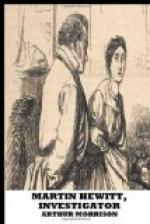“First, Mr. Dixon,” he said, as he dropped into an easy chair in the private room, “let me ease your mind by the information that I have been most extraordinarily lucky; in fact, I think you have no further cause for anxiety. Here are the negatives. They were not all quite dry when I—well, what?—stole them, I suppose I must say; so that they have stuck together a bit, and probably the films are damaged. But you don’t mind that, I suppose?”
He laid a small parcel, wrapped in a newspaper, on the table. The engineer hastily tore away the paper and took up five or six glass photographic negatives, of a half-plate size, which were damp, and stuck together by the gelatine films in couples. He held them, one after another, up to the light of the window, and glanced through them. Then, with a great sigh of relief, he placed them on the hearth and pounded them to dust and fragments with the poker.
For a few seconds neither spoke. Then Dixon, flinging himself into a chair, said:
“Mr. Hewitt, I can’t express my obligation to you. What would have happened if you had failed, I prefer not to think of. But what shall we do with Ritter now? The other man hasn’t been here yet, by the by.”
“No; the fact is I didn’t deliver the letter. The worthy gentleman saved me a world of trouble by taking himself out of the way.” Hewitt laughed. “I’m afraid he has rather got himself into a mess by trying two kinds of theft at once, and you may not be sorry to hear that his attempt on your torpedo plans is likely to bring him a dose of penal servitude for something else. I’ll tell you what has happened.
“Little Carton Street, Westminster, I found to be a seedy sort of place—one of those old streets that have seen much better days. A good many people seem to live in each house—they are fairly large houses, by the way—and there is quite a company of bell-handles on each doorpost, all down the side like organ-stops. A barber had possession of the ground floor front of No. 27 for trade purposes, so to him I went. ’Can you tell me,’ I said, ‘where in this house I can find Mr. Hunter?’ He looked doubtful, so I went on: ’His friend will do, you know—I can’t think of his name; foreign gentleman, dark, with a bushy beard.’
“The barber understood at once. ‘Oh, that’s Mirsky, I expect,’ he said. ’Now, I come to think of it, he has had letters addressed to Hunter once or twice; I’ve took ’em in. Top floor back.’
“This was good so far. I had got at ‘Mr. Hunter’s’ other alias. So, by way of possessing him with the idea that I knew all about him, I determined to ask for him as Mirsky before handing over the letter addressed to him as Hunter. A little bluff of that sort is invaluable at the right time. At the top floor back I stopped at the door and tried to open it at once, but it was locked. I could hear somebody scuttling about within, as though carrying things about, and I knocked again. In a little while the door opened about a foot, and there stood Mr. Hunter—or Mirsky, as you like—the man who, in the character of a traveler in steam-packing, came here twice to-day. He was in his shirt-sleeves, and cuddled something under his arm, hastily covered with a spotted pocket-handkerchief.




